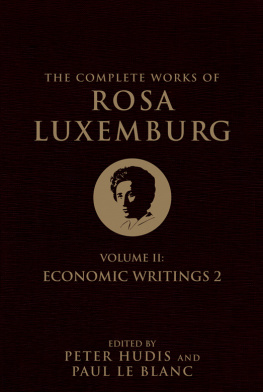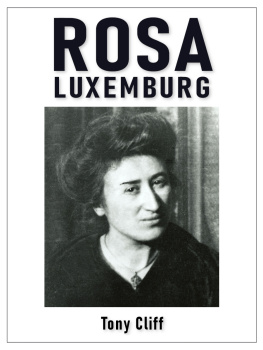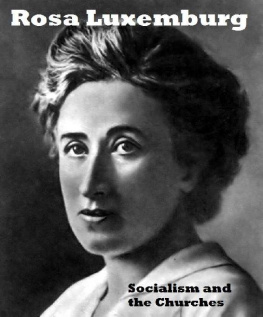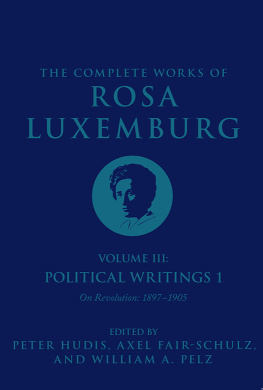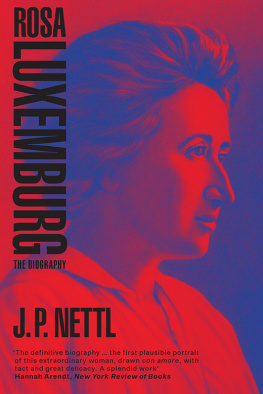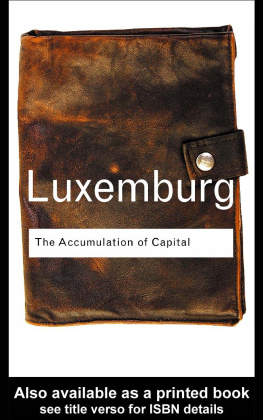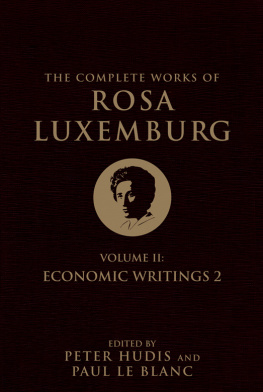The Complete Works
of Rosa Luxemburg
VOLUME II, ECONOMIC WRITINGS 2
Edited by Peter Hudis
and Paul Le Blanc
Translated by Nicholas Gray
and George Shriver

In memory of Abdirahim Hassan (19882013),
and all other fallen comrades.
Verso would like to express its gratitude to Rosa Luxemburg Stiftung for help in publishing this book

The publisher also gratefully acknowledges the assistance of Dietz Verlag, publisher of Rosa Luxemburgs Gesammelte Werke, the German source of all English translations herein
First published by Verso 2015
Translation Nicholas Gray (The Accumulation of Capital and The Second and Third Volumes of Capital)
George Shriver (The Accumulation of Capital, Or, What the Epigones Have Made Out of Marxs TheoryAn Anti-Critique) 2015
Introduction Paul Le Blanc 2015
All rights reserved
The moral rights of the authors have been asserted
1 3 5 7 9 10 8 6 4 2
Verso
U.K.: 6 Meard Street, London W1F 0EG
U.S.: 20 Jay Street, Suite 1010, Brooklyn, NY 11201
www.versobooks.com
Verso is the imprint of New Left Books
ISBN-13: 978-1-78168-852-6 (HC)
eISBN-13: 978-1-78168-854-0 (US)
eISBN-13: 978-1-78168-853-3 (UK)
British Library Cataloguing in Publication Data
A catalogue record for this book is available from the British Library
Library of Congress Cataloging-in-Publication Data
A catalog record for this book is available from the Library of Congress
Typeset in Minion Pro by MJ&N Gavan, Truro, Cornwall
Printed in the U.S. by Maple Press
Contents
This second volume in the Complete Works of Rosa Luxemburg contains three key writings in which a revolutionary theorist is seeking to understand the vibrant complexities of the global economy. Luxemburgs purpose, of course, was to help a potentially revolutionary working-class majority to replace global capitalism with a socialism in which economic resources and institutions would be socially owned, democratically controlled, and utilized to allow for the free and full development of all. Her idealistic aspiration to achieve what might be was tempered with a tough-minded determination to comprehend what is.
In the preceding collection of Luxemburgs economic writings, the first volume of the Complete Works, we see a powerful intellect absorbing, applying, and sharing the contributions developed by Karl Marx and his collaborator Frederick Engels. Her lively intelligence compelled her to embark on a considerable amount of research, engaging with new data and the studies of other scholars, in order to bring Marxs contributions up to date and connect them with the ever-changing realities of the most dynamic economic system in human history. Yet as the editor of that volume, Peter Hudis, has noted, by 191112, while working on her popular exposition Introduction to Political Economy, Luxemburg found herself at loggerheads with Marx himself:
She became convinced that Marx failed to adequately explain the limits to capitalist expansion in his formulae of expanded reproduction at the end of Volume 1 of Capital, which assumes a closed capitalist society without foreign trade. Luxemburg viewed this as a very serious error, since she took it to imply the possibility of infinite capitalist expansionsomething that, if true, would reduce the effort to create a socialist society to being a subjective, utopian wish instead of an objective, historical necessity.
The three works presented here, in new translations by Nicholas Gray and George Shriver, flow from that challengethe centerpiece of this volume being her magnum opus of 1913, The Accumulation of Capital: A Contribution to the Economic Theory of Imperialism, complemented by two shorter works.
The shortest of these, a critical-minded summary of the second and third volumes of Capital, was written at the request of her friend Franz Mehring for inclusion in his major biography Karl Marx, published in 1918. Here Luxemburg offers clear, succinct, appreciative summaries, while also indicating what she felt
________________
Peter Hudis, Introduction: The Multidimensionality of Rosa Luxemburg, The Complete Works of Rosa Luxemburg, Vol. 1 (London: Verso, 2013), p. xiv.
Luxemburg notes that in the first volume of Capital it was the workshop, the deep shaft of labor within society, in which the source of capitalist enrichment was detected; while in the second and third (unfinished) volumes of Marxs masterwork the focus is quite different: Warehouses, banks, the stock market, financial transactions, distressed landowners and their concerns are foregrounded here. Here, the worker plays no part. She comments that the circulation of capital, the world of commerce, the actual realization of surplus value (which is created through the exploitation of the workers examined in Volume I), these processes take place behind his back, after his hide has already been tanned, as she words it with dark humor. She adds eloquently, Amid the noisy hustle and bustle of the throng as it conducts its business, the workers are only encountered at dawn as they trudge in droves to their factories, and at dusk when they are once again spewed out in long columns.
This different focus of volumes 2 and 3 is seen by Luxemburg as providing workers with a much-needed understanding that will assist in overcoming the reformist illusions common among too many trade unionists. Within the labor movement, she noted, there has been a strong inclination to argue that there is a harmony of interests between capital and labor, which businessmen myopically fail to recognize, with reformist spokesmen advancing the hope of a palliative patching-up of economic anarchy. In fact, she argues, the three volumes of Capital, taken together, demonstrate the systems insatiable drive to accumulate, [which] tends to immediately surpass any constraint posed by consumption, no matter how much this consumption is expanded through the increased purchasing power of a particular social stratum or by the conquest of new markets.
One aspect of her own economic masterwork of 1913, The Accumulation of Capital: A Contribution to the Economic Theory of Imperialism, is meant to be a correction of Marx and a necessary fine-tuning of the Marxist understanding
________________
.
.
.
In the same year that saw the publication of her book, one finds, embedded in celebratory comments about the working-class holiday of May Day, Luxemburgs anticipation of World War Is bloody explosion, only one year away:
The whole development, the whole tendency of imperialism in the last decade leads the international working class to see more clearly and more tangibly that only the personal stepping forward of the broadest masses, their personal political action, mass demonstrations, and mass strikes which must sooner or later open into a period of revolutionary struggles for the power in the state, can give the correct answer of the proletariat to the immense oppression of imperialistic policy. In this moment of armament lunacy and war orgies, only the resolute will to struggle of the working masses, their capacity and readiness for powerful mass actions, can maintain world peace and push away the menacing world conflagration The more the struggle for peace and socialism takes root in the strongest troops of the International, the German working class, the greater is our guarantee that out of the world war which, sooner or later, is unavoidable, will come forth a definite and victorious struggle between the world of labor and that of capital.

